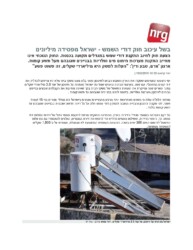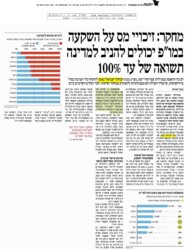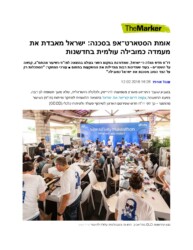Connect to schedule an interview
+972.4.829.2329
Neaman in the media
Addicted to plastic bag
Is the levy of ten Agorot on the use of disposable bags at the supermarket will shift the habit Israelis have of excessive consumption of these bags?
Dozens of execution companies reached freezing or breaking down in the last couple years
Arnon Bentur
The journal article tries to rely on the research report to make the statement that the “Israeli construction industry cannot produce annually more than 40,000 dwelling units”. However it ignores the main message in this work which states that in the current mode of operation the industry cannot reach the 40000 target but with technological upgrading to improve its productivity it can make it. This is the challenge and the opportunity, and the government should employ policies which can make it happen.
The work suggest line of action for that to happen.
Work and Society – Second story in series
Dr. Reuven Gal and Dr. Gilad Malach, who have been studying for years the Integration of Ultra-Orthodox Jews in the public and the business sector, sketch the current situation in the Ultra-Orthodox employment. Joining them is Asaf Malachi, head of Ultra-Orthodox research discipline, who also tries to predict the future of employment.
Bags Law: punishing the weakest due to the minority of pollutants
There are two main beneficiaries from the bags law passed by the Knesset – canvas bags manufacturers and environmental activists. The Ministry of Environmental Protection will benefit from the tax as payments would be delivered to ‘cleanliness fund.
Due to a delay in the solar water heaters Law – Israel is losing millions
A bill that requires the installation of solar water heaters in tall buildings is stuck in the Knesset. Current law does not require the installation of solar water heating systems in buildings higher than nine stories. Organization ‘Man, Nature and Law’: “The cost to the economy is billions of shekels, it is simply a crime”
Research: Tax credits for R&D investment can produce a yield of up to 100%
Benjamin Bental, Dan Peled
In light of slowdown in activity in the high-tech industry, Samuel Neaman Institute offers to add a support tool relatively free of bureaucracy, to encourage non-technological companies to invest in research and development and technical innovation, alongside existing R&D support programs.
Who needs private pension funds? Look at Japan and South Korea
The pension crisis requires rethinking about saving mechanism. Prof. Sheshinski and Samuel Neaman Institute offer a fundamental alter the existing system.
Start-up nation at risk: Israel is losing its position as a global leader in innovation
A new report reveals that Israel, ranked second in the world in R&D as a percentage of GDP, is stagnating while many countries are increasing their investments in the sector. The study authors- “looking only at the good side endangers Israel as a leading country”.
Electric vehicle or normal? What calculation you should do before purchasing
Ofira Ayalon, Idan Liebes
A new study examined the real costs of driving electric or Hybrid vehicle, and answered the question – when choosing them becomes worthwhile not only to the environment but also to the pocket
The specific contribution of Technion graduates
Research done at the Samuel Neaman Institute for National Policy Research, Technion, reveals that the investment in creating human capital at the Technion-Israel Institute of Technology yields annual social rates of return of between 76 per cent and 197 per cent, at least, and in absolute (dollar) terms, between $35 billion and $60 billion dollars, over the 50-year working lifetime of a graduating class. These findings were published in research done by Prof. Amnon Frenkel and Prof. (emer.) Shlomo Maital, at the S. Neaman Institute, and show that investment in human capital at Technion, to educate students in science and technology, yields exceptionally high social rates of return to the Israel economy, without risk. These findings show that government investment in Technion science and technology students has proven itself worthwhile, since the return on these investments are higher than most other investments and are without risk (since productive engineers and scientists always emerge as a result).










